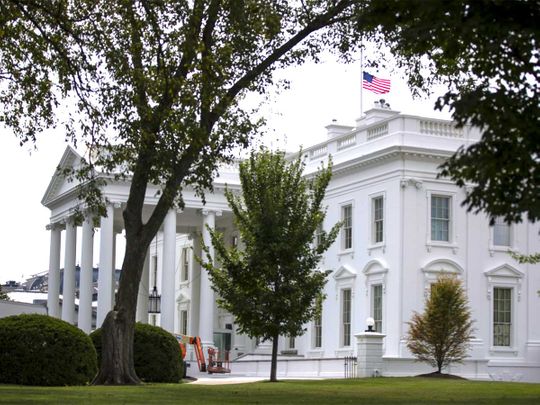
My favourite coffee mug is emblazoned with words of advice: “Lead like Jed. Advise like Leo. Think like Josh. Speak like C.J. Argue like Toby. Write like Sam.” What the mug doesn’t say but implies by its very existence: “Believe in America like a fan of ‘The West Wing.’”
Set in the White House of fictional President Jed Bartlet, “The West Wing” is an hourlong serial drama that aired on NBC from 1999 to 2006. It features the moral quandaries of President Bartlet — economist, Nobel laureate and Democrat — along with those of his family and staff. The show’s cast of thousands includes assistants and interns, journalists, political consultants, pollsters, White House attorneys, military advisers, Supreme Court justices, and congressional adversaries and allies.
The fictional West Wing of two decades ago doesn’t always hold up to 21st-century standards for workplace relationships and attitudes, but my coffee mug sums up the main characters pretty well. Imperfect though they can sometimes be — making colossal errors of judgement, sabotaging promising relationships, being rude to subordinates — they work collectively as a kind of role model for unstinting service to the country we all love.
Storylines on “The West Wing” include the usual grudges, hookups, missed opportunities and hurt feelings endemic to television drama, but the show is far more than a night-time soap opera. At its heart, “The West Wing” is a multi-year civics lesson, and every episode is a parable.
Season by season, the show demonstrates the way the federal government is supposed to work and why. What do checks and balances look like in practice? Why is it sometimes necessary to compromise, and when is compromise nothing more than capitulation? Whose interest trumps the interests of everyone else? (Hint: It’s never the elected official’s.) What is the right relationship between the White House and the press?
It’s all delivered with the wit, humour and staccato pacing that we now think of as the calling card of the show’s creator, Aaron Sorkin — a style that has become a cultural shorthand for verbal virtuosity and moral righteousness. In a debate last week, Jon Ossoff, a Democratic Senate candidate in Georgia, eviscerated Republican Senator David Perdue with a brilliant elucidation of the senator’s failures. The commentator Joshua Holland called it “the most West Wing moment I’ve ever seen in real life.”
I watched “The West Wing” for the first time when it was still airing on network television. My father loved it, never mind that he was a lifelong Republican. I had small children and precious little time for television, but I loved my father, so I watched “The West Wing” too. It was a way for us to frame the debate we’d been having about politics since the Reagan era. When Dad developed cancer at the beginning of the show’s second season, “The West Wing” offered something to talk about that had nothing to do with chemotherapy or radiation or feeding tubes. Years later, my mother bought all seven seasons on DVD. After she died, too, I watched them all again.
In those days, watching “The West Wing” still felt a little bit like a kumbaya singalong, a shared experience that transcends generational and political orientation. This year I’ve been watching the series again, this time on Netflix, and it doesn’t feel like that anymore.
Today it’s a trip not just to another time — a time when computers covered an entire desk and cell phones were half the size of our heads — but to another planet. A place where people with different politics don’t fear one another and hate one another the way they fear and hate one another now. “The West Wing” may be a fairy tale but we have just had four years of drama and disdain for science and journalism.
— Margaret Renkl is a contributing opinion writer who covers flora, fauna, politics and culture in the American South. The New York Times







